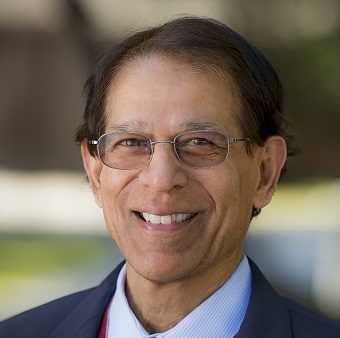Biography
Neuropsychiatry

Dilip
Jeste
Dilip V. Jeste, M.D. is the Distinguished Professor of Psychiatry and Neurosciences at University of California. He has published 14 books, over 160 book chapters, and 725 articles on his research in schizophrenia and neuropsychiatric interventions. He is past president of the American Psychiatric Association and founding president of International College of Geriatric Psychoneuropharmacology.
Transcription of the video
Which domain or aspect of social life will show the most significant positive societal and/or psychological change in response to the pandemic?
The COVID-19 pandemic has psychologically affected every single person in the US. We all personally know of somebody else who tested positive for coronavirus. The COVID-19 has impacted lives outside of physical health also. For example, having to work from home or having to take care of children who could not go to their schools. Thus, this virus has an adverse impact on the whole population without an exception. This is unprecedented in the modern times. Probably one positive effect of tears could be that everybody will feel empathy for others who are affected more severely no matter where they live, or who they are.
What kind of wisdom will people need to capitalize on the positive societal and/or psychological change after the pandemic?
The component of wisdom that people will need to capitalize on is compassion and altruism. Empathy means sharing somebody else’s emotions or thoughts. But that’s not enough. We must act on their empathy. Compassion means acting on the empathy and going out to help others. Altruism goes even beyond compassion. And it means helping others without expecting any reward in return. People should help others, no matter where they are, no matter what age, sex, race, national regions they have, or even their political beliefs. It will mean truly “sharing the world,” as John Lennon famously put it in a beautiful song.
Which domain or aspect of social life will show the most significant negative societal and/or psychological change in response to the pandemic?
I worry that the political polarization that we are observing today in the US and the world will only increase. The recent US election was viewed as having winners and losers. And this categorization didn’t apply only to the candidates. It also applied to the supporters. And these two groups are nearly equal in size. It is like the West Side Story’s Jets and Sharks. The watch word is revenge by the losers. As Mahatma Gandhi said: “an eye for an eye leaves both people blind.” The current political division is also splitting families and friends. And this is becoming a vicious circle.
What kind of wisdom will people need to master to overcome major negative societal and/or psychological changes after the pandemic?
What is needed are two other components of wisdom, namely, self-reflection and acceptance of uncertainty and diversity of perspectives. Both of these are in very much short supply right now, and there is no sign of abatement There’s a critical need for wise leadership that has the power of inspiring people to change their attitudes and behaviors in a major way. I am optimistic that the Homo sapiens, which literally means a wise man–and of course, woman, will slowly but surely succeed in breaking the vicious cycle that we are seeing now and convert that into a virtuous cycle. The component of wisdom that is particularly important right now is emotional regulation with positivity. It is perfectly understandable why people feel angry, depressed, sad, frustrated, distressed right now. But we need to control these negative emotions and slowly begin to replace them with positivity. After the World War II and the Holocaust, humanity came together. And we established institutions like the United Nations and the World Health Organization, which are still functioning well. Effective vaccines against the coronavirus are already here. Of course, it will take a few months for their distribution and mass inoculation. Past pandemics of plague and cholera are history now. And the same thing will happen with COVID-19, too. Once herd immunity develops across the globe, the requirements, well physical distancing, will go away. And we all will be able to have the social connectedness that is so critical for our health, well being and longevity.
What piece of wisdom do people need to make it through the pandemic?
The component of wisdom that is particularly important right now is emotional regulation with positivity. It is perfectly understandable why people feel angry, depressed, sad, frustrated, distressed right now. But we need to control these negative emotions and slowly begin to replace them with positivity. After the World War II and the Holocaust, humanity came together. And we established institutions like the United Nations and the World Health Organization, which are still functioning well. Effective vaccines against the coronavirus are already here. Of course, it will take a few months for their distribution and mass inoculation. Past pandemics of plague and cholera are history now. And the same thing will happen with COVID-19, too. Once herd immunity develops across the globe, the requirements, well physical distancing, will go away. And we all will be able to have the social connectedness that is so critical for our health, well being and longevity.
Themes discussed in this interview

